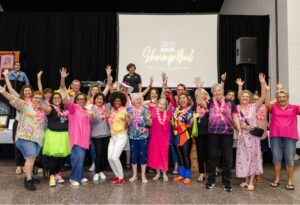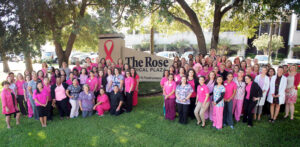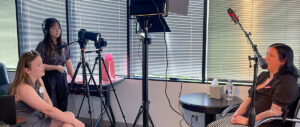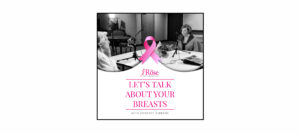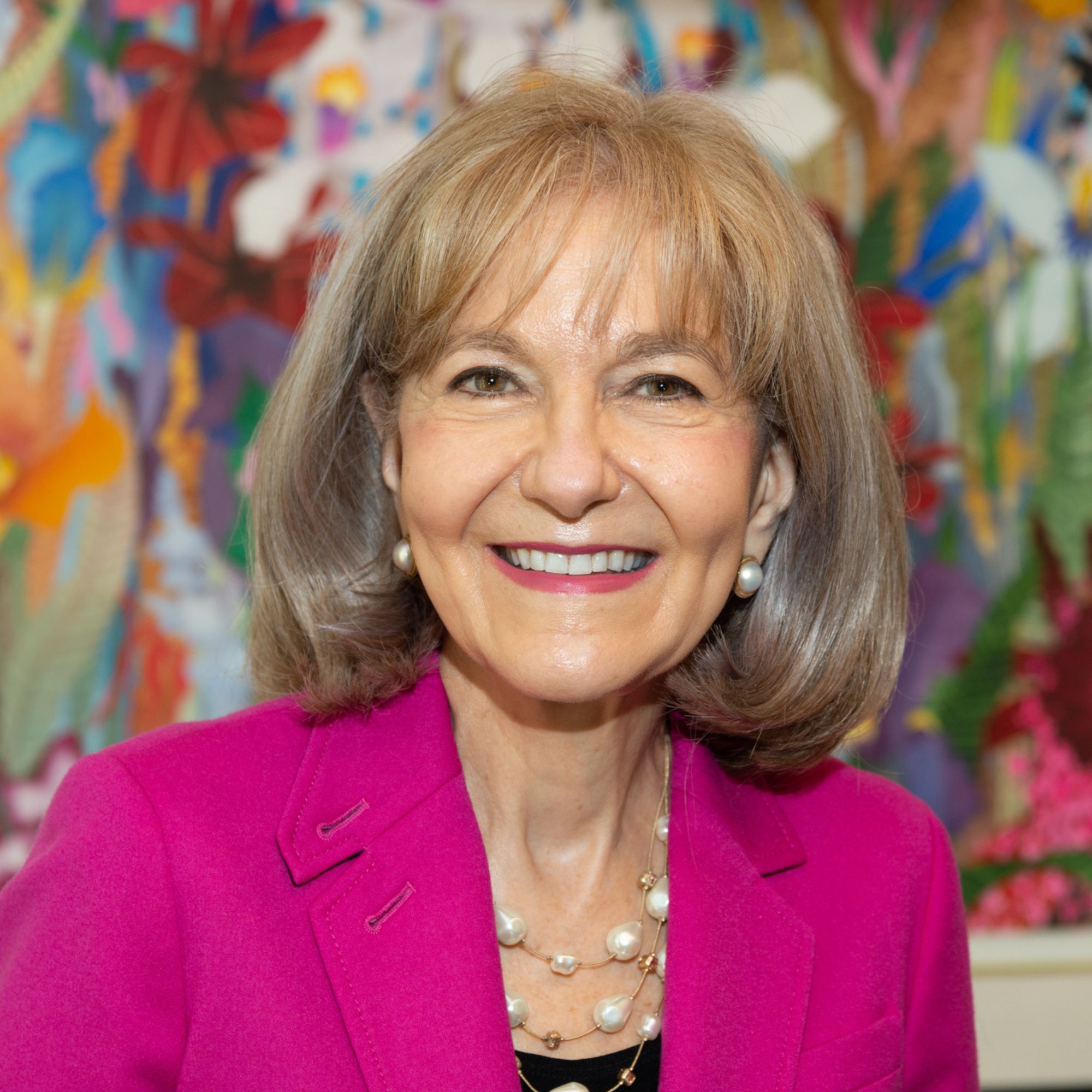Dorothy: [00:00:00] Theresa Einhorn has been on The Rose’s Board of Directors for over six years, and she’s currently our Chair. Today, she shares the hurdles she overcame in a male dominated legal field and reflects on her experiences with those in her life who have fought breast cancer. She learned how to be her own advocate very early on, when in her early 20s, she was It was her father who had to give his consent for her to have a breast biopsy.
Ever since then, she has been on a mission to empower women and be sure that they understand what they can do in this world. She’s an inspiration. A truly significant advocate for The Rose, and for every woman who is fighting breast cancer.
When you subscribe to our show, You help us grow. Someone you know may need to hear this story. So please, share with your family and friends. And [00:01:00] consider supporting our mission. Your donation can help save the life of an uninsured woman.
Let’s Talk About Your Breast. A different kind of podcast presented to you by The Rose. A breast center of excellence and a Texas treasure. You’re gonna hear frank discussions about tough topics, and you’re gonna learn why knowing about your breast could save your life.
Theresa, thank you so much for being with us here today.
Theresa: My pleasure.
Dorothy: You know you’ve been our Board Chair for the past two years, and you’ve been on the Board since August of 2019. So, tell us a little bit about what it means to be the Chair of a Board of a non profit.
Theresa: Well, first I’d like to say it is a great honor and pleasure and extremely rewarding to me personally to Chair the Board of Directors of The Rose.
And [00:02:00] in response to your question, what does it mean to be a Board Chair? First and foremost, it’s absolutely essential that the Board Chair be committed and passionate about the mission of the organization. The, uh, basic functions of a Board Chair is to bring the individual Board members together so they function as an effective group and to partner with the CEO and support the CEO in, uh, pursuing and, uh, formulating the strategic mission of the organization. And I can’t emphasize how essential it is to have an effective Board. An effective functioning Board for the success of any non profit.
Dorothy: That is important. It’s very important. But now, Theresa, your background was not in health care.
Theresa: No, it was not.
Dorothy: Tell us about what you [00:03:00] did before you retired for so many years.
Theresa: For so many years, yes. I, uh, am an attorney. I no longer practice law, but I practiced law for many years in Houston, most recently as a senior partner with the Haynes and Boone law firm, where I handled large commercial and corporate financial transactions. So, my background is, uh, well trained for a Board Chair, has been very helpful, and I love the Houston community and have been so, uh, fortunate to be able to transition from the active practice of law to using my skills in the non profit sector, serving on a number of Boards and committees.
Dorothy: And I’ve noticed that a lot of your Boards, a lot of your passions have to do with women, have to do with women’s health, moving women [00:04:00] forward, um, being sure they have the same opportunities in life. And I’ve always admired the role you played as a successful lawyer in a world that was primarily men. Did it, did that influence how you feel about your different, you know, being a volunteer is, no matter what, no matter what Board you serve on, it’s still, you’re a volunteer, so that’s a lot of your time.
Theresa: Well, there, you’ve tapped on a lot of issues there. Um, I will say that yes, I am fully committed to the empowerment of women. As I think it is Jimmy Carter, his institute said, when you empower a woman, you empower the community.
So, which I, I believe very much. Uh, when I practice law, I did practice law with, I mean, it was male [00:05:00] dominated profession. So, um, and we can all tell a lot of really great stories about that. But to me, that was a challenge and a challenge that I enjoyed meeting and meeting successfully. So, circling back to your question, there are a lot of aspects of your question, Dorothy. Tell me again which one you want me to focus on.
Dorothy: I’m just curious how, what drives your commitment to women?
Theresa: Well my commitment is to the community as a whole. Um, I am the child of immigrants who worked hard to support their family. Spent, uh, many years, uh, seeking to get to the United States, we were able to come. We’re all citizens now. Um, they worked so hard and their background and that environment shaped my outlook on the world, and I feel that all of [00:06:00] us who have as much as I have, have a moral obligation and commitment, really, to give back to the community and to better our community. And Women are such an important part in empowering families, in empowering individuals.
And women also have a tendency to take care of themselves last. And we are doing a better job nowadays, but, you know, traditionally, Women really needed to be encouraged to take care of themselves. They needed some help in being empowered to take advantage of opportunities that historically were available only to men. And I think that’s where I’m drawn to. to, uh, my commitment to empowering women, and also, after practicing law, I loved all my male partners and my male clients, um, but it is really a delight to work with a lot of women.
Dorothy: So, who was the [00:07:00] most dominant person in your early life? Your father? Your mother?
Theresa: Uh, both, but probably my father, um, but I love them both clearly.
Dorothy: Yeah, yeah. That’s a huge, um, change of life to come here. And you didn’t originally come to the United States.
Theresa: Well, I came as a child, so I really grew up here. So, um, my heritage is Ukrainian. Um, that was my first language. Um, and my dad and mom spent several years trying to get into the United States and finally made here and I made it here. And I am so lucky because really I just came with them. I didn’t have to do any work and ended up here. And as a result, how lucky are all of we to be here, all of us to be here.
Dorothy: In your, in your work as a, as an attorney, did you find yourself having to choose between the roles you played? Were you ever truly allowed just to [00:08:00] be you?
Theresa: Oh, wow, what an interesting question. Well, the answer is no, um, I started practicing law many years ago and, uh, it was a great adventure but I really, I mean, there was no way back then that you could just be you. You had to learn how to act and as one gets older, one learns the roles better. But it was a challenge. A challenge, interesting challenge. I enjoyed it very much. Um, but no, I don’t think a young woman, maybe today more so than back then, but no, we definitely could not just be us.
Dorothy: Theresa, I hear that even from the young women, you know, we are, we all fall into labels and roles and those kinds of things. And I, and I think trying to figure out who you are is one of our jobs in life, for male or female.
Theresa: I think we do a much better job today, uh, giving guidance to young women. You know, there are seminars, there are books. Um, I think a lot of us really had to figure it out [00:09:00] along the way. So, probably took us longer than it would have if we had had more guidance.
Dorothy: Right. So now, as far as you know, there’s no breast cancer in your family history.
Theresa: That’s right.
Dorothy: But you became well aware of the need to be very, uh, diligent in your body’s health early on.
Theresa: Yes. Yes. Um, so, first of all, I will say that I have been touched directly by breast cancer. Many friends have been through it most successfully thanks to the research that’s been done, thanks to organizations like The Rose, um, but not all successfully. So, I don’t think I know anyone who hasn’t been touched in some way, either family or friends, um, by breast cancer. Um, I had a scare when I was younger, back when mammograms were full body x rays and biopsies were not simple, they were actually, um, Like, operations with radical consents to be [00:10:00] signed. Uh, so that was, um, that was a real wake up call early on. So I’ve always been really vigilant, um, about healthcare generally and about breast cancer.
Dorothy: You were only 20 years old?
Theresa: I was 20 years old, um, and at the time it was really all pretty primitive. And, uh, I think I’ve told you this story before, but I’ll mention it again. And, um, at the time it was terrifying, but I couldn’t sign my own consent. My dad had to come with me and they asked, uh, the, I guess the hospital, the surgeon asked my dad to sign a consent saying that if he found anything that he found to be, I guess, ultra suspicious or that he thought was breast cancer, that he could do a full mastectomy.
My dad refused to sign it. Thank you, dad. Um, and right there while I was laying on the table, uh, Before getting my anesthesia, um, my dad and the surgeon had an argument, and my dad didn’t sign it. So, that was, uh, that was a [00:11:00] wake up call.
Dorothy: Oh, good for him. But imagine how far we’ve come. There was a time, like you said, women didn’t have that choice. And the equipment, everything, everything is so different now.
Theresa: It is. Thank goodness.
Dorothy: So, if you had, um, one message to give to women, and then, and I’m talking about Theresa the woman. What would it be?
Theresa: I would, like so many others who have been asked this question, it would be to take care of yourself. Not only physically, but also emotionally. To do what you can to reach that state of inner peace, um, and contentment.
Dorothy: So how does Theresa take care of herself? What is your self care?
Theresa: Well, I’d say it’s deliberate, and it’s both physical and emotional, and I do, um, deliberately focus on controlling my emotions. And trying to find that place of inner [00:12:00] contentment.
Dorothy: And many other things like eating healthy.
Theresa: Oh yes, yes, yes. Eating healthy, getting enough sleep, focusing on positive emotions like gratitude, compassion, empathy, um, social connection, family.
Dorothy: Family. Do you think you’re more busy now since you’ve, quote, “retired?”
Theresa: Oh gosh, well, I’m busy in a different way and really enjoying it so much.
Dorothy: It sounds like it. So what have you learned in these, what, we’re talking last six, seven years with The Rose, what, what have you learned in general, specifically?
Theresa: Oh gosh, I’ve learned so much. I’ve learned about access to healthcare and lack thereof. I’ve learned about, uh, the state of Texas and its policies. I’ve learned about what we need to do. And I’ve learned about how committed and [00:13:00] united a staff can be. Our staff is just amazing under the atmosphere that you’ve, the culture, that you’ve created together with your executive team of inclusiveness and compassion for our patient care. And I’ve learned that it is possible to create that environment for caring for patients and it’s really been amazing to see.
Dorothy: Oh, thank you for that. But it’s truly my staff. They, they understand—
Theresa: It’s from the top. That message comes from the top.
Dorothy: Thank you for that. I am, I am so very proud of the staff. But I do think there’s not a person involved with The Rose that hasn’t seen what happens when you don’t have access to care. I think it’s become, beyond just a job for most of our folks. It’s a personal issue that they take on.
Theresa: Oh, that really comes through when I talk to the staff. It is more than just a job. I mean, it is a calling.
Dorothy: Yeah, and there’s, there are so many people that are still in need. [00:14:00] I’m, I’m glad you touched upon our policies in Texas, which we won’t go into too much, but there needs to be a lot more attention on what could help women get through times of difficulty, times of disease. And, you know, it’s truly about poverty. It’s truly about not having access. Uh, we see that over and over again. I know you’ve met some of our patients who have been there.
Theresa: It’s been, it’s been such, it’s been so eye opening and such a privilege to talk to your staff members.
Dorothy: Thank you. So, Theresa, in your, in your world, do you think the, um, women that you encounter are, I’m sure they’re more aware of health care and their own needs. But do you think they act on it, regardless of their age, their success, take care of themselves even when they know about it?
Theresa: Well, that is a [00:15:00] very interesting question. I hope so. I do know some people, uh, who might delay because they’re afraid of the news that they might get, but I would say for the most part that, uh, professional women nowadays, and especially in Houston where the healthcare industry is so accessible to us and, uh, is such, I mean, the experts are so available to us.
I think in Houston that women are good about that. Yes, are aware and good on following up.
Dorothy: Well, that’s encouraging.
Theresa: It is. Now, I know that, The Rose, we serve a wide community, um, of many backgrounds, and in some communities, self care is a challenge, especially when it comes to personal topics like breast care.
Dorothy: Especially, yes. So, talk to us about what you think we could do for the future of women, especially in health care.
Theresa: Well, I’d love to see a world where all women have access to [00:16:00] health care. And there’s really a lot of work to be done, and I’ve learned a lot of this through working with The Rose. And advocacy, education and advocacy are so important.
Education, in part, educating women as to what’s available today for them. But, broader education of the community as a whole as to what we could do to promote health care and advocacy, learning what are the policies that would benefit our community. For example, Medicaid expansion.
Dorothy: Mm-Hmm.
Theresa: Also economic opportunities for women, more child care access, uh, fair pay, economic opportunities that will enable women to pay for health insurance, to pay for health care. And then [00:17:00] thirdly, stigma, removing the stigma. Um, there’s still some stigma, um, and some reluctance in some of our communities. And bringing that out in the open and removing the stigma, uh, would go a long way.
Dorothy: You know, during COVID, we certainly learned that childcare becomes the critical access point for women to returning to work. You know, that just shifted the entire workforce. And I don’t think I was ever as aware before that time of how dependent our mothers are on having that childcare. And we do nothing to make it easier.
Theresa: Right.
Dorothy: You know, it’s, it is, uh, really sad in so many ways. So those are some of the key points that you’ve brought up. I’m always curious about what advocacy means to different people. So, tell us what that means for you. I mean, certainly your father was an, [00:18:00] you learned that early, was an advocate. You know, you don’t have to go along with what the doctor says. So, what else would that mean to you?
Theresa: Well, when I think of advocacy, I’m not thinking so much as to, questioning the doctor. I’m thinking of it at a broader level, and that is, I don’t think everyone realizes the policies, um, that could be implemented and spending a little more money on access to health care would even people who are looking at the bottom line would save us money in the long run. Um, so I’m, and by advocacy, I’m thinking of people educating themselves as to what are the policies for access to health care in our state, in our country.
And then, Finding out how they can make a difference to change them, whether it be something as simple as voting or, um, engaging to educate others as well, becoming business leaders and advocating. So when I think about advocacy, that’s what I think of, and obviously nonprofits can’t engage [00:19:00] in lobbying, but there’s a lot that we can do short of that.
Dorothy: Right. Our stories go so far.
Theresa: Yes.
Dorothy: In telling that story, yes. Theresa, if you were to come back 50 years after you’ve died, what would you hope to see that you had left during your lifetime?
Theresa: Well, I’d like to make a difference in someone’s life. As the, you know, as the Dalai Lama says, we’re here on earth for such a short time and the meaning of life is if you can make a difference in someone’s life.
Dorothy: So if you were looking back and saw that you had made a difference.
Theresa: Right. And I feel that some, all of us who work with and for and support The Rose are making a difference.
Dorothy: Oh, yes.
Theresa: And we’re making a difference that will last for generations.
Dorothy: In, in the world that, uh, you’ve seen all these, these different things that you’ve seen that women have been involved in. If you could have been anyone else doing any [00:20:00] other thing, what would it have been?
Theresa: Oh my gosh, that is such a fun question and, you know, I didn’t ponder that before I came here. I can think of a lot of fun answers. I know that my, in my profession, I always wanted to be general counsel of the World Bank, but I didn’t make that.
Um, but look, now that I’m not practicing law all day, every day, I can look at it from a broader perspective. Oh my goodness. Um. Well, you know, I have to say I’m pretty happy with where I am and what I’m doing, and I really feel fortunate. You know, when I was young Uh, when I started law school, only less than 5 percent of the nation’s attorneys were women. So that was a big adventure.
Dorothy: Oh, yes.
Theresa: It was a great adventure for me. And it was, um, when I look back at it, I just think, what a trip. And you know, I’m happy with it and I’m happy with where I am and what I’ve done.
Dorothy: Oh, that is so important in anyone’s life that we realize this one life we had. We [00:21:00] were happy in it.
Theresa: Yes. Yes.
Dorothy: Well, thank you so much for being with us today. You have been an incredibly inspiring Board Chair. Let me tell you.
Theresa: Oh, thank you Dorothy.
Dorothy: And such a support through all these years. And I think A lot of what i’ve appreciated about you is you have let us Vision. You have let us dream. You know, you’ve not ever said: “oh, we can’t do that.” So I think that’s the other thing about being a Board Chair for a CEO. That is so important. So thank you for that.
Theresa: Oh, well, thank you dorothy for the privilege of being Board Chair and of sitting with you during this interview. I’ve really enjoyed it.
Post-Credits: Thank you for joining us today on Let’s Talk About Your Breasts This podcast is produced by Speke Podcasting and brought to you by The Rose. Visit therose.org to learn more about our organization. Subscribe to our podcast. Share episodes with friends and join the conversation on social media using [00:22:00] #Let’sTalkAboutYourBreasts. We welcome your feedback and suggestions. Consider supporting The Rose. Your gift can make the difference to a person in need. And remember self care is not selfish. It’s essential.


